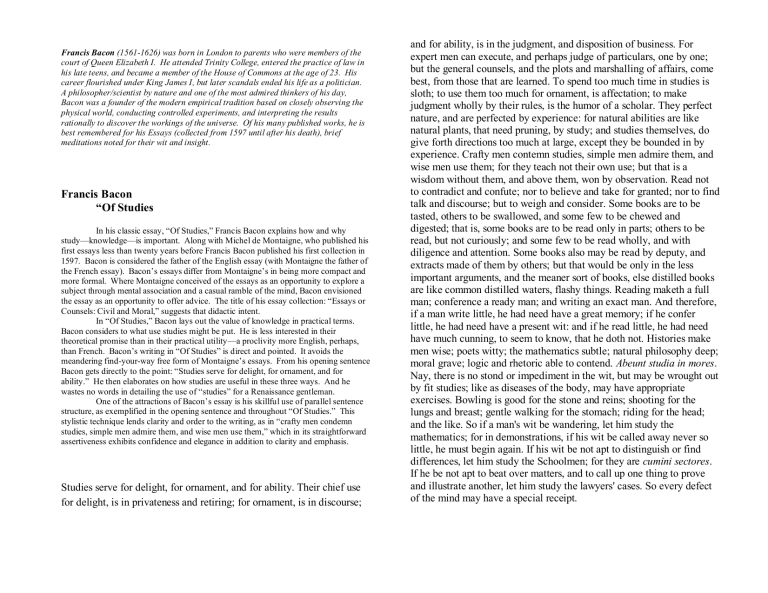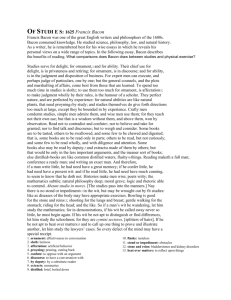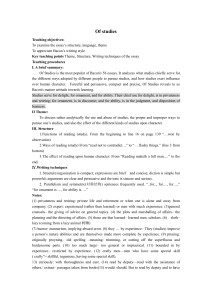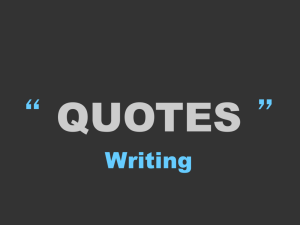
Francis Bacon (1561-1626) was born in London to parents who were members of the court of Queen Elizabeth I. He attended Trinity College, entered the practice of law in his late teens, and became a member of the House of Commons at the age of 23. His career flourished under King James I, but later scandals ended his life as a politician. A philosopher/scientist by nature and one of the most admired thinkers of his day, Bacon was a founder of the modern empirical tradition based on closely observing the physical world, conducting controlled experiments, and interpreting the results rationally to discover the workings of the universe. Of his many published works, he is best remembered for his Essays (collected from 1597 until after his death), brief meditations noted for their wit and insight. Francis Bacon “Of Studies In his classic essay, “Of Studies,” Francis Bacon explains how and why study—knowledge—is important. Along with Michel de Montaigne, who published his first essays less than twenty years before Francis Bacon published his first collection in 1597. Bacon is considered the father of the English essay (with Montaigne the father of the French essay). Bacon’s essays differ from Montaigne’s in being more compact and more formal. Where Montaigne conceived of the essays as an opportunity to explore a subject through mental association and a casual ramble of the mind, Bacon envisioned the essay as an opportunity to offer advice. The title of his essay collection: “Essays or Counsels: Civil and Moral,” suggests that didactic intent. In “Of Studies,” Bacon lays out the value of knowledge in practical terms. Bacon considers to what use studies might be put. He is less interested in their theoretical promise than in their practical utility—a proclivity more English, perhaps, than French. Bacon’s writing in “Of Studies” is direct and pointed. It avoids the meandering find-your-way free form of Montaigne’s essays. From his opening sentence Bacon gets directly to the point: “Studies serve for delight, for ornament, and for ability.” He then elaborates on how studies are useful in these three ways. And he wastes no words in detailing the use of “studies” for a Renaissance gentleman. One of the attractions of Bacon’s essay is his skillful use of parallel sentence structure, as exemplified in the opening sentence and throughout “Of Studies.” This stylistic technique lends clarity and order to the writing, as in “crafty men condemn studies, simple men admire them, and wise men use them,” which in its straightforward assertiveness exhibits confidence and elegance in addition to clarity and emphasis. Studies serve for delight, for ornament, and for ability. Their chief use for delight, is in privateness and retiring; for ornament, is in discourse; and for ability, is in the judgment, and disposition of business. For expert men can execute, and perhaps judge of particulars, one by one; but the general counsels, and the plots and marshalling of affairs, come best, from those that are learned. To spend too much time in studies is sloth; to use them too much for ornament, is affectation; to make judgment wholly by their rules, is the humor of a scholar. They perfect nature, and are perfected by experience: for natural abilities are like natural plants, that need pruning, by study; and studies themselves, do give forth directions too much at large, except they be bounded in by experience. Crafty men contemn studies, simple men admire them, and wise men use them; for they teach not their own use; but that is a wisdom without them, and above them, won by observation. Read not to contradict and confute; nor to believe and take for granted; nor to find talk and discourse; but to weigh and consider. Some books are to be tasted, others to be swallowed, and some few to be chewed and digested; that is, some books are to be read only in parts; others to be read, but not curiously; and some few to be read wholly, and with diligence and attention. Some books also may be read by deputy, and extracts made of them by others; but that would be only in the less important arguments, and the meaner sort of books, else distilled books are like common distilled waters, flashy things. Reading maketh a full man; conference a ready man; and writing an exact man. And therefore, if a man write little, he had need have a great memory; if he confer little, he had need have a present wit: and if he read little, he had need have much cunning, to seem to know, that he doth not. Histories make men wise; poets witty; the mathematics subtle; natural philosophy deep; moral grave; logic and rhetoric able to contend. Abeunt studia in mores. Nay, there is no stond or impediment in the wit, but may be wrought out by fit studies; like as diseases of the body, may have appropriate exercises. Bowling is good for the stone and reins; shooting for the lungs and breast; gentle walking for the stomach; riding for the head; and the like. So if a man's wit be wandering, let him study the mathematics; for in demonstrations, if his wit be called away never so little, he must begin again. If his wit be not apt to distinguish or find differences, let him study the Schoolmen; for they are cumini sectores. If he be not apt to beat over matters, and to call up one thing to prove and illustrate another, let him study the lawyers' cases. So every defect of the mind may have a special receipt.




